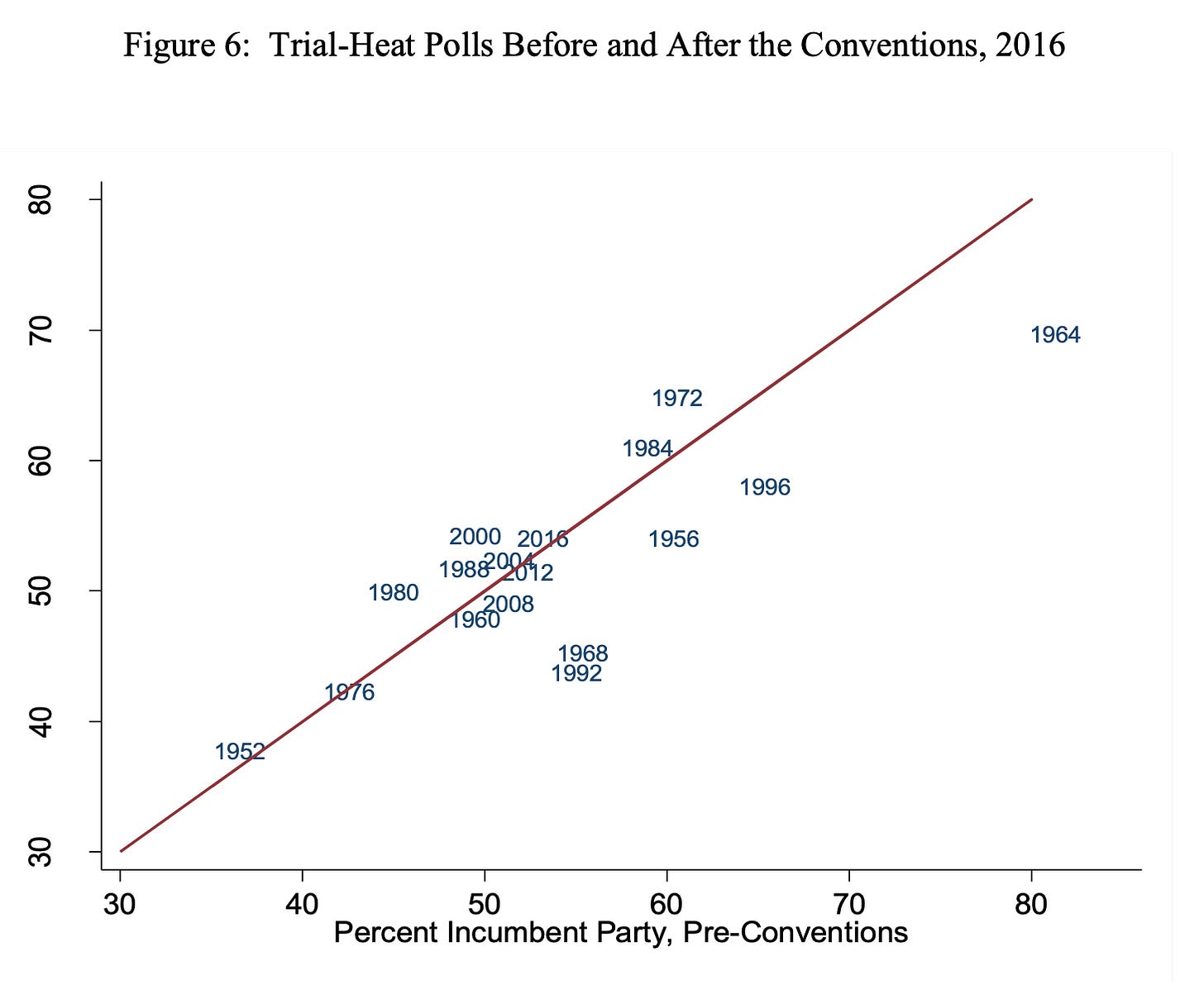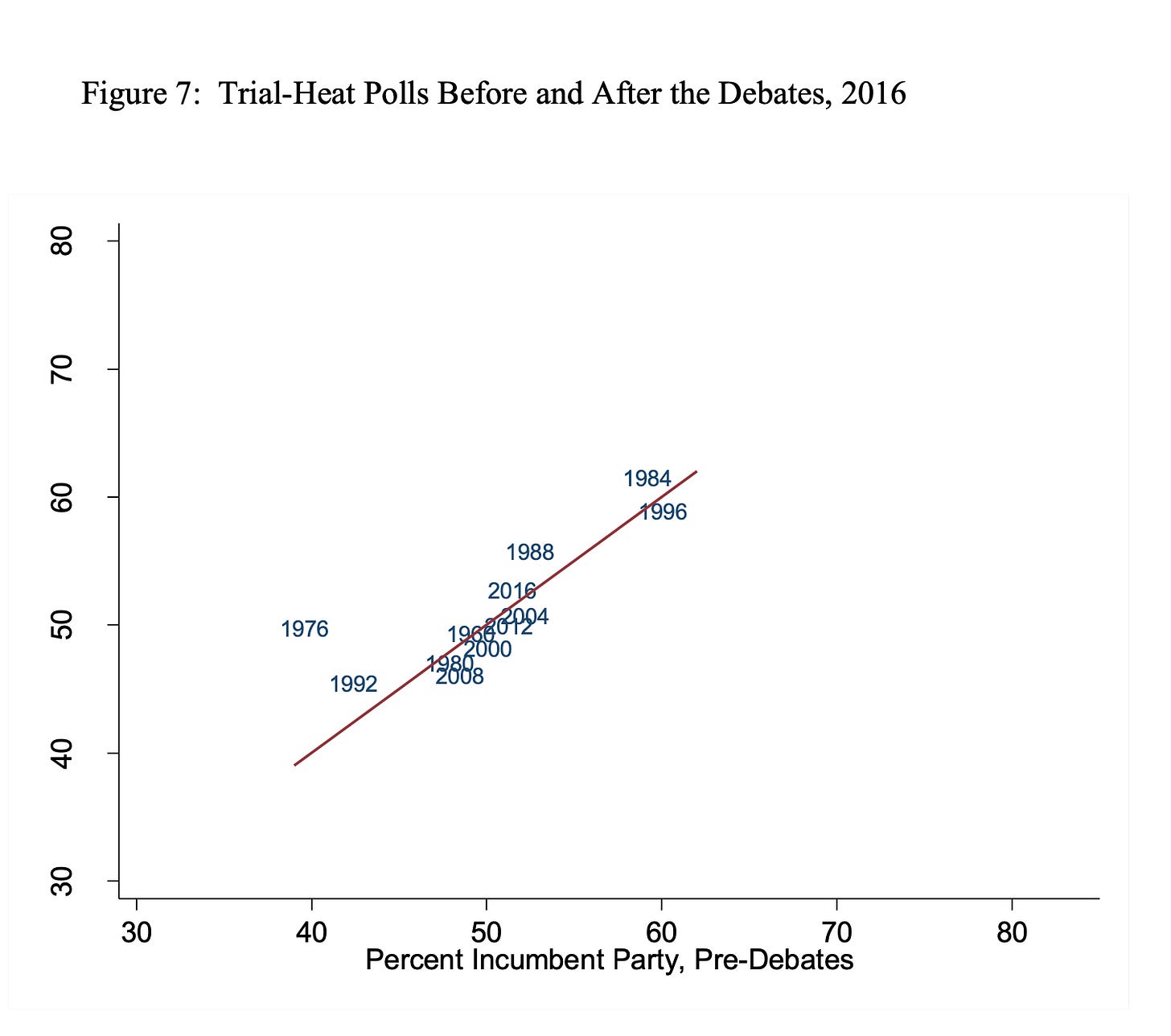What Trump, trailing Biden, could get out of the debates 📊 September 27, 2020
Debates can provide meaningful short-term bounces, but long-term bumps are rare and usually not decisive
For those following along at home: Are we now allowed to write off at-home haircuts as business expenses? If so, I need to call my accountant. And this is my newsletter.
As always, I invite you to drop me a line (or just respond to this email). Please click/tap the ❤️ beside my name if you like what you’re reading; it’s our little trick to sway Substack’s curation algorithm in our favor. If you want more content, I publish subscriber-only posts 1-2x a week.
Dear reader,
Sometimes, I actually plan out what I’m going to write in these things. Lucky you, dear reader, that I did so this week. The product of that foresight is an email that will prepare you for the debate on Tuesday night. It’s a chat about whether debates even matter — and if they do, what Trump (currently on pace to lose the election badly) can get out of them.
But recent news has just crushed me. Hours ago, the New York Times published a bombshell inquiry into the president’s tax returns and reported that he has paid less in income tax over the last 5 years than I have in any one year. This is a bummer because — if x = y — it means that I am actually a billionaire but someone has swapped out all of my real bank accounts with some young up-start journalists. More seriously, it’s also a bummer because I haven’t yet thought enough about the issue to add a revolutionary new insight to the mix of coverage I’m sure most of you have already seen on the subject, though I can’t just pretend that I haven’t seen it either.
I have managed to settle on one 🔥 hot 🔥 take for now, though. It’s that the revelations in the New York Times probably won't change the race. Trump's financial scheming is well-known and has likely been factored into undecided voters' decisions already. The NYT reporting is confirmatory evidence in an overarching story that has been told since (at least) 2015. However, and here’s the kicker, Trump is in a deep hole in the polls either way! By way of decreasing the opportunity for a surprise event in his favor, every day that passes with the polls still showing him down in Florida and the Midwest also decreases his chance of winning the election.
This week’s presidential debates will be his first moment to talk about the NYT story directly to the American people, and with his chief political rival. My guess is that he’ll call it fake news and we’ll all forget about this in a week, but maybe I’ll be wrong.
—Elliott
What Trump, trailing Biden, can get out of the debates
Debates can provide meaningful short-term bounces, but long-term bumps are rare and usually not decisive
Let me keep this as brief and information-dense as possible.
I wrote a book chapter with a professor, Christopher Wlezien, of mine shortly after the 2016 election. Among other things, we covered the subject of how debates affect preferences rather thoroughly. It probably makes the most sense for me to start by simply excerpting what we wrote for you all here:
The polls still do indicate real, if modest, change in voter preferences during the 2016 campaign. What exactly happened to produce the evident ebb and flow in electoral support? It is hard to tell for sure, as we know that campaigns represent a series of many events, many of which are difficult to identify conceptually or empirically. Indeed, when studying campaign effects, political scientists typically focus on the effects of very prominent events, such as nominating conventions and general election debates in the US (see, e.g., Holbrook, 1996; Shaw, 1999).
The previous research indicates that conventions have big effects that mostly cancel out but can alter the state of the race. Debates have smaller, less consequential effects.
One way to assess the effects of conventions and debates, is to compare the poll shares before and after the two seasons. One can compare results of polls before the first convention with results of polls taken after the second convention. Likewise, one can compare results from before the first debate with those from after the last debate. This is what Erikson and Wlezien (2012; 2014) do in their analysis of election campaigns between 1952 and 2012. We update their analysis to include 2016 and plot the results in Figures 6-7.
In Figure 6, we can see that poll results one week before and then two weeks after the conventions are correlated but that the two usually differ. Most importantly, we can see that the leader in the polls often changes as a result of the conventions, specifically, in five of the 17 years: 1968, 1988, 1992, 2000, and 2004. The leaders in these years – as in all other years in the figure – went on to win the popular vote. The conventions did not change the leader in 2016 but did have a sizable net effect, as Clinton’s share increased from 51.1% percent before the Republican convention to 53.7% after the Democratic convention. The effect may have been exaggerated some by her sharp drown in the polls a week before the convention season began, in the wake of FBI Director Comey’s July 5 announcement regarding Clinton’s e-mails. Also note that the lead that she emerged with did not last very long, as Clinton entered the fall campaign with 51.6% in the polls, just about where she ended the campaign.
As can be seen in Figure 7, with the sole of exception of 1976, debates have smaller net effects. Perhaps most importantly, they are less consequential, as the lead has changed hands after the debates only one time out of the twelve presidential election campaigns during which debates have been held, namely, in 2000, when George W. Bush took the lead from Gore only to lose it and the actual popular vote. Of course, we cannot be absolutely sure that the debates were the reason(s) that Bush gained a temporary advantage in 2000, but we do know that it was the only year in which the lead did change during the debate season. Debates still may have had effects in other years, including 2016, when Clinton’s share increased from 51.9% to 52.8%, seemingly enough to win 270 electoral college votes and then some. As we have seen, the lead did not last, costing her the White House.
While conventions and debates are – or can be – important, they account for only a modest portion of the variance in poll results. Even attributing all poll movement during the entire convention and debate seasons leaves 70-75 percent of the variance unaccounted for over the full election year (Wlezien and Erikson, 2001; Wlezien, 2003). These results tell us that the numerous other events, mostly small, when taken together, have a greater impact than the handful of very visible events that occupy most media and scholarly attention. The problem, of course, is that it isdifficult to identify these “other” events and even harder to detect their effects. Some may be easier than others, however, such as Comey’s two intrusions into the 2016 campaign.
And here are figures 6 and 7:


And emphasizing the relevant text for figure 7:
With the sole of exception of 1976, debates have smaller net effects. Perhaps most importantly, they are less consequential, as the lead has changed hands after the debates only one time out of the twelve presidential election campaigns during which debates have been held
In sum, we shouldn’t expect debates to fundamentally alter the state of the race — at least not on average. Even in 2016 (when there were far more undecided and third-party voters than there are now), they did not “matter”. We suspect that much of the pre- and post-debate stasis in modern campaigns is attributable to the fact that the information about the candidates is robust and has penetrated to the depths of the public consciousness by the time debates roll around, and most partisans are already set in their ways.
…
However, there is some room for presidential candidates to use them to their advantage. The most notable account, as we write, was in 1976 when Jimmy Carter fell from a nearly 20-point lead in polls of the two-party vote to bare 50-50 split with Gerald Ford. (And yes, for what it’s worth, this does fly in the face of the conventional wisdom about Ford’s “blunder” in saying the Soviet Union wasn’t dominating eastern Europe.) Ford’s rise during debate season in 1976 may also have been a product of Carter’s convention bounce fading. But it is also evidence that the stage offers candidates the ability to rebrand themselves. In 1976, it may have been Ford's ability to escape his pardoning Nixon two years earlier, or to simply appear to Americans, over and over, as their incumbent president (which confers its own advantages).
Will Trump be able to do anything at the debates to shore up his position? I can certainly imagine some steps that could help him, though my gut says all of them range from unlikely to impossible. First, the president could directly address his failures with the coronavirus and detail a plan to remedy his early comments and come out of the pandemic on top. He could take similar steps on the economy and health care; promising to lower taxes on the poor and middle income and outlining a real plan to expand health coverage for rural areas would go far (though it’s almost unimaginable he would embrace these positions or have a real desire to accomplish them).
But I suspect none of this will happen. In fact, with the NYT report coming out just days before the debate, it’s Joe Biden who heads in with the advantage. He will be able to exploit Trump’s write-offs as evidence for his class-based political appeals. Trump paying only $750 in taxes is, of course, an ample point in suggesting that the 2017 tax cuts were a Republican effort to slash rates for their leaders and monied donors. And with voters siding with Democrats on SCOTUS, the virus, the economy and Obamacare, it’s unlikely that Trump convinces him on the other issues of the campaign.
In the end, history reminds us that the debates are mostly overblown: little more than the media rolling out the red carpet to the nominees so the people who already tune in to political coverage (the majority of which who have decided how they’re going to vote) can get to know the candidates just that much better.
But debates can be important in highlighting the difference between the candidates’ visions for America. This year, I am interested in waiting to see how the media will cover Trump’s recent refusal to peacefully transfer the government to Biden if he loses — as well as his numerous other attacks on our institutions. I don’t imagine they will deal with it as strongly as I want them to, but any direct confrontation on the subject (and hearing Biden’s response) would be welcome.
Posts for subscribers
September 25: America's founders empowered citizens to pick democracy over the Constitution. The question at the center of the fight over the Supreme Court is whether we, the people, want to make that choice
What I'm Reading and Working On
Please see last week’s recommendation of Jill Lepore’s If Then: How the Simulmatics Corporation Invented the Future.
Thanks for reading!
Thanks for reading. I’ll be back in your inbox next Sunday. In the meantime, follow me online or reach out via email if you’d like to engage. I’d love to hear from you.
If you want more content, I publish subscriber-only posts on Substack 1-3 times each week. Sign up today for $5/month (or $50/year) by clicking on the following button. Even if you don't want the extra posts, the funds go toward supporting the time spent writing this free, weekly letter. Your support makes this all possible!
Photo contest
This feature of the weekly newsletter continues to be a high point of my week. This is Tango, a spaniel who looks ready for a little splish-splash in the creek.

For next week’s contest, send me a photo of your pet(s) to elliott@gelliottmorris.com!



